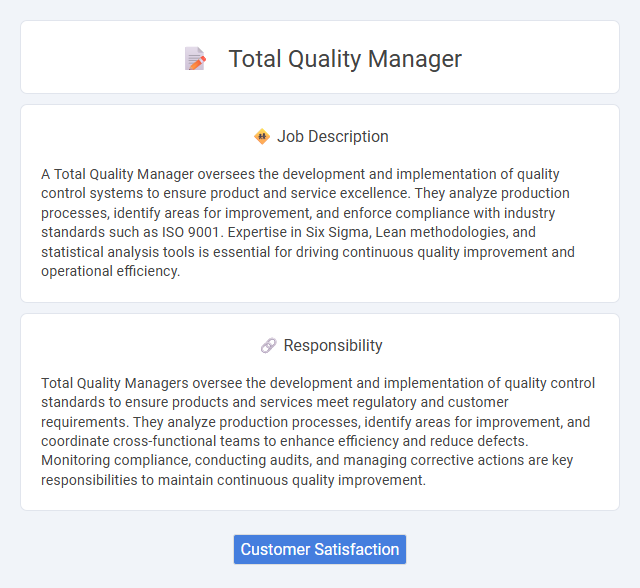
A Total Quality Manager oversees the development and implementation of quality control systems to ensure product and service excellence. They analyze production processes, identify areas for improvement, and enforce compliance with industry standards such as ISO 9001. Expertise in Six Sigma, Lean methodologies, and statistical analysis tools is essential for driving continuous quality improvement and operational efficiency.
Individuals with strong analytical skills and a detail-oriented mindset are likely to thrive as Total Quality Managers, as the role demands continuous monitoring and improvement of organizational processes. Those who possess excellent communication abilities and a collaborative attitude may find themselves more suitable, given the need to coordinate across departments and lead quality initiatives effectively. People who prefer routine tasks without strategic problem-solving may not be as well-suited to this dynamic and responsibility-driven position.
Qualification
A Total Quality Manager must possess extensive knowledge in quality management systems such as ISO 9001 and Six Sigma methodologies. Proven experience in statistical process control, root cause analysis, and continuous improvement techniques is essential for ensuring product and service excellence. Strong leadership skills and proficiency in data-driven decision-making tools enhance the ability to drive organizational quality initiatives effectively.
Responsibility
Total Quality Managers oversee the development and implementation of quality control standards to ensure products and services meet regulatory and customer requirements. They analyze production processes, identify areas for improvement, and coordinate cross-functional teams to enhance efficiency and reduce defects. Monitoring compliance, conducting audits, and managing corrective actions are key responsibilities to maintain continuous quality improvement.
Benefit
A Total Quality Manager likely enhances organizational efficiency by implementing robust quality control systems that reduce defects and waste. This role probably contributes to improved customer satisfaction, as consistent product and service quality tends to build trust and loyalty. Companies may experience increased profitability and competitive advantage through the continuous improvement initiatives typically driven by a skilled Total Quality Manager.
Challenge
The Total Quality Manager role likely involves navigating complex challenges related to maintaining consistent product standards across diverse processes. There is a high probability of encountering resistance while implementing continuous improvement initiatives aimed at enhancing quality metrics. Managing cross-functional teams and aligning various departments' objectives may require advanced communication and problem-solving skills.
Career Advancement
Total Quality Managers drive organizational excellence by implementing quality control systems and leading continuous improvement initiatives that enhance product reliability and customer satisfaction. Expertise in Six Sigma, Lean methodologies, and regulatory compliance positions professionals for advancement into senior leadership roles such as Quality Director or Chief Operating Officer. Mastery in data analysis, risk management, and cross-functional collaboration further accelerates career growth within manufacturing, healthcare, and service industries.
Key Terms
Customer Satisfaction
A Total Quality Manager ensures customer satisfaction by implementing rigorous quality control processes and continuous improvement strategies that align products and services with client expectations. They analyze customer feedback and performance metrics to identify defects, streamline workflows, and enhance product reliability. Their role is critical in fostering a customer-centric culture that drives loyalty and competitive advantage.
 kuljobs.com
kuljobs.com